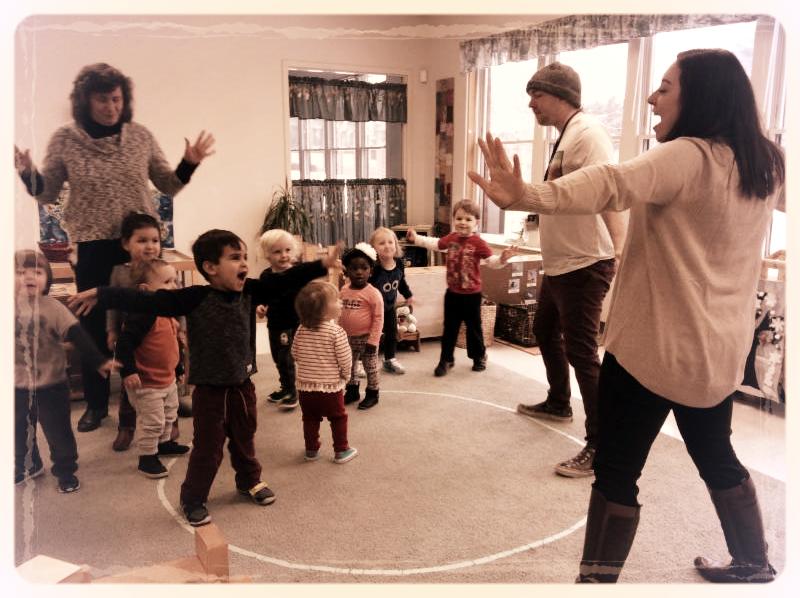 |
 |
 |
 |
 |
 |
 |
 |
 |
 |
 |
|
|
W E D N E S D A Y W E E K L Y
|
|
In this Issue
Upcoming Events
February 22
Parent Education Webinar: Bullying Prevention
7:30 p.m.
Register
Drop off time - 11 a.m.
Learn more in Lisa's message!
Online Safety Info Night
March 1-3
Delaware Association of Independent Schools (DAIS) Art Show
Pilot School
Featuring art by the students of the 9-12 Program
Opening Reception -
4-6:30 p.m. on March 1
Learn More
March 1
2016-17 Re-enrollment Deadline
Secure your child's spot for next year!
Learn More
|
Head of School Lisa A. Lalama
Tomorrow is another much-anticipated day at WMS - Dads' Day! There is little that children enjoy more than having their dads (and other special friends) join them in their classrooms to learn more about their work, their friends and their school. They are so proud to show off their world to their dads. From the youngest toddler, who may love Dad joining in the morning fun and cry when he has to leave, to the more seasoned 9-12 students, each child enjoys having his or her own special visitor.
Dads' Day is also a chance for dads to take some time to step a bit further into their child's world. Though they went to school, chances are their school did not look like WMS. Perhaps there were rows of desks, chalkboards or one-size-fits-all furniture. Most likely, the teachers were not using their first names, instead being called by a surname. Those are the easy differences to note. The things that may not be as apparent are the things that add the most to your child's experience at WMS. The respect that is given to each child is notable. The teacher observations that lead to the lessons that are designed with the child in mind is one reason children love to learn. They are treated and approached as individuals. Their teachers know what they enjoy learning and how they learn best. Just as the furniture is not one-size-fits-all, neither are the lessons.
We hope that you will be able to join us for Dads' Day. It is your chance to learn more about the place where your children spend their day. You will be able to walk in your child's shoes for just a little while. Have fun!

|
|
News & Notes

|
Important Re-enrollment Reminder - Contracts/Deposits Due Next Week

The deadline for submitting contracts and deposits for the 2017-18 school year is
Wednesday, March 1, 2017
.
The deposit secures your child's spot and supports the planning process for the new school year. In order to retain our amazing teaching staff, it is important that we are able to offer contracts as early as possible, which cannot be done until we have a clear idea of our enrollment numbers for next school year.
After the March 1 deadline, we also begin to enroll new families and, therefore, your child's space cannot be guaranteed. We expect that some of our programs will be filled to capacity next year. In addition, first-round financial aid awards* must also be accepted by this deadline or they will be re-allocated.
Important:
Please note that a $100 late fee will be assessed for all re-enrollment deposits not received by the due date. If you anticipate any problem with submitting your contract and deposit by March 1, please contact Nancy Oddo, Business Manager, at 302-475-0555 or at
[email protected].
*All families who applied for financial assistance will receive a letter from WMS's business office, regardless of whether or not we are able to offer a grant to your family. If your family has not yet received a letter, please inform Nancy Oddo to ensure that your mailing information is correct in our database.
|

TONIGHT - Parent Education Webinar - Bullying Prevention: Promoting Positive Relationships & Conflict Resolution
Wednesday, February 22 at 7:30 p.m. (Earn Co-op time by attending!)
Presented by Assistant Head of School Laurie Orsic
 Parents and teachers share a desire to promote positive relationships and appropriate conflict resolution amongst the children in their care. They are especially concerned about bullies and want to help their students to effectively handle situations in which bullying could occur.
What is bullying and how does it compare to typical peer conflicts? How do parents and teachers prevent bullying or help their children if they become involved in a bullying situation? What bullying prevention resources are available to parents and children? What classroom management strategies are in place to fortify students against bullies or minimize the chances that bullying might occur?
Please join us to learn more about this important topic, to understand prevention strategies and to hear about a range of resources available to parents and their children. Parents and teachers share a desire to promote positive relationships and appropriate conflict resolution amongst the children in their care. They are especially concerned about bullies and want to help their students to effectively handle situations in which bullying could occur.
What is bullying and how does it compare to typical peer conflicts? How do parents and teachers prevent bullying or help their children if they become involved in a bullying situation? What bullying prevention resources are available to parents and children? What classroom management strategies are in place to fortify students against bullies or minimize the chances that bullying might occur?
Please join us to learn more about this important topic, to understand prevention strategies and to hear about a range of resources available to parents and their children.

Please register in advance. After signing up, you will receive login instructions to ensure that you can access the webinar on the evening of the event
|
 Online Safety Info Night for Parents Online Safety Info Night for Parents
Thursday, February 23 at 6:30 p.m.
Rollins Center at St. Edmond's Academy
This presentation will help parents understand what their children do online and how to foster healthy conversations about digital safety. Topics include good digital citizenship, online safety and the dangers of cyber bullying.
|
Today's Learners

|
|
|
 |
 |
 |
 |
 |
 |
 |
 |
 |
 |
 |
 |
 |
 |
 |
 |
 |
 |
Fast Four: Books on Friendship
Presented by Assistant Head of School Laurie Orsic
|
Early Childhood Music - It's more than just song and dance!
by Music Teacher Heather Wadler

There is a common misconception that music class for young children simply consists of singing and dancing. While it may seem this way at first glance, there is much more to early childhood music education. In fact, music teachers use a process that is similar to the way in which classroom teachers guide children to understand language.
The process has four steps - listening, speaking, reading and writing. Let us think for a second about how children learn language. As newborns, babies hear language being spoken all around them. They are absorbing what they hear, which eventually moves to vocalizing (even if it doesn't make much sense) and then imitating (or babbling). After this process, children are ready to speak real words - then phrases and sentences. Only later do they learn to read and write.
In comparison, toddlers might sit and observe, going through the stage of musical development called absorption. These students aren't ready to sing yet, but they are watching and listening to what's happening around them. Students who have progressed to the next stage of musical development are producing babbling sounds. They experiment with various pitches and rhythms by clapping their hands or stomping their feet at random times. Some give responses that are more purposeful and reflect the key or meter of the song or chant they hear. This prepares students to eventually sing songs, imitate rhythms, and to think and create in music. If this exposure and informal guidance does not happen early in life, children might not be prepared for formal instruction.
So, how does movement factor into this process? Researcher and teachers who have been studying early childhood music education have noticed that movement is a natural, sometimes even spontaneous, response to any kind of music. Music theorist and researcher Edwin Gordon believes that movement may be the key to a young child's musical development, as it assists students in refining their own coordination. Children gradually start to learn a sense of beat and pitch when they integrate coordination between their breath, body and singing. We develop this coordination through exploring sounds and movements through musical characteristics that contrast such as fast/slow, high/low, loud/soft and choppy/smooth. Movements as simple as swaying to the music help even the youngest students develop their coordination.
At WMS, students are exposed to a creative musical environment at as early as 12 months of age. They participate in 20 minutes of music class each week, in addition to the many songs and chants they sing with their classroom teachers. At home, you can also help your child's musical development by singing and playing with him or her on a regular basis. Listening to a variety of music at home or in the car will expose your child to sounds that expand his tonal and rhythmic vocabulary, helping prepare him for formal musical instruction down the road.
|
 The Wednesday Weekly shares WMS news and events that are relevant to the families in our community.
Please send submissions to
[email protected]
by 4:30 p.m. on the Friday prior
to the issue in which you wish to include your information. Content may be edited for length
and style and may be held for a future issue due to space constraints.
For more information, contact Noel Dietrich, Director of Communications.
|
|
| |
 |
|
 |
|
 |
 |
 |
 |
 |
 |
 |
 |
 |
|
 |
|